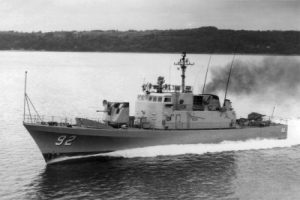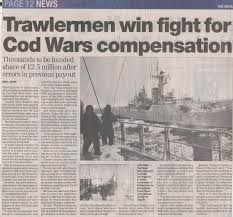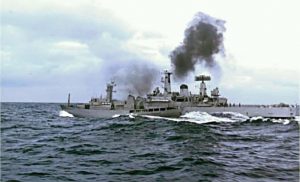 Would you want your nation to go to war over fish? Would you even consider that nations might do that? Well, enter the Cod Wars. The Cod Wars were disputes over Iceland’s territorial waters, fought in four bouts over a 25 year period: The Proto Cod War, between 1952 and 1956; the First Cod War between 1958 and 1961; the Second Cod War between 1972 and 1973; and the Third Cod War between 1975 and 1976. Iceland wanted to expand its territorial waters and exclude foreign fishing fleets. Britain would have none of that. The British distant fishing fleet fished extensively in the waters off Iceland, and supplied a lot of fish and chips shops. But Britain also wanted to prevent precedents that violated the principle of narrow territorial waters. Narrow territorial waters were key for the Royal Navy to sail freely and continue to project power across the world. The Icelanders were motivated by the prospective economic gains. An extension of its territorial waters meant greater catches, and a way to exclude competing trawler fleets and conserve important fishing grounds. The country’s heavy dependence on fishing meant that extensions had a significant impact on Iceland’s Gross Domestic Product, roughly one-quarter of which was tied to the fisheries sector, export earnings one-half to two-thirds of which were tied to the fisheries sector and employment roughly 15 percent of which was in the fisheries sector.
Would you want your nation to go to war over fish? Would you even consider that nations might do that? Well, enter the Cod Wars. The Cod Wars were disputes over Iceland’s territorial waters, fought in four bouts over a 25 year period: The Proto Cod War, between 1952 and 1956; the First Cod War between 1958 and 1961; the Second Cod War between 1972 and 1973; and the Third Cod War between 1975 and 1976. Iceland wanted to expand its territorial waters and exclude foreign fishing fleets. Britain would have none of that. The British distant fishing fleet fished extensively in the waters off Iceland, and supplied a lot of fish and chips shops. But Britain also wanted to prevent precedents that violated the principle of narrow territorial waters. Narrow territorial waters were key for the Royal Navy to sail freely and continue to project power across the world. The Icelanders were motivated by the prospective economic gains. An extension of its territorial waters meant greater catches, and a way to exclude competing trawler fleets and conserve important fishing grounds. The country’s heavy dependence on fishing meant that extensions had a significant impact on Iceland’s Gross Domestic Product, roughly one-quarter of which was tied to the fisheries sector, export earnings one-half to two-thirds of which were tied to the fisheries sector and employment roughly 15 percent of which was in the fisheries sector.
Each Cod War broke out when Iceland extended its territorial waters and the British failed to comply with the new Icelandic regulations. Clashes and confrontations started between Icelandic patrol ships and British trawlers. The harassment of British trawlers in the contested waters provoked the British to sanction the Icelanders in the Proto Cod War preventing the Icelanders from accessing their largest export market and send the Royal Navy into the contested waters during the last three Cod Wars. Neither side actively tried to cause casualties but the clashes at sea were still dangerous. I can’t imagine a war, in which the combatants try not to  hurt each other. Nevertheless, individuals were injured, and there was one fatality on the Icelandic side. Surely bargaining would have saved both sides the inevitable costs and risks of unilateral, unrecognized expansions. Historians and political scientists have identified how domestic pressure on elites and the nature of alliance politics contributed to miscalculation on both sides that contributed to bargaining failure.
hurt each other. Nevertheless, individuals were injured, and there was one fatality on the Icelandic side. Surely bargaining would have saved both sides the inevitable costs and risks of unilateral, unrecognized expansions. Historians and political scientists have identified how domestic pressure on elites and the nature of alliance politics contributed to miscalculation on both sides that contributed to bargaining failure.
Neither government really understood the public pressure that their counterparts were under. Icelandic politicians were particularly vulnerable to domestic pressure, as opposition parties, media and public sentiment likened compromise to treason. Contradictory statements from different members of the Icelandic government, diplomats and other elites contributed to the mistaken British view that the Icelanders were divided and not fully committed to expansive and legally dubious extensions. The British trawling industry, which had a staunch ally in the Ministry of Agriculture and Fisheries, put great pressure on the British government. The Ministry favored aggressive and extreme actions in the disputes, while the Foreign Office was more conciliatory and concerned about the Cod Wars’ impact on British security interests and international standing. The Icelanders deemed it unlikely that their NATO ally and friend would sanction the Icelanders or send in the Royal Navy. Both sides also believed that the United States and other NATO allies would side with them. Even though the American position on territorial waters tended to line up with the British view, and the United States opposed Iceland’s unilateralism, the United States ultimately intervened on Iceland’s behalf. They had a stake in the outcome. The United States bought up unsold Icelandic fish, making the British sanctions toothless in the Proto Cod War. The United States pressured Britain behind the scenes in the last three Cod Wars. At stake was a strategically important United States base in Keflavík, which was needed to track Soviet submarine activity. For the United States, Iceland was an important chain in the line of defense in case of war with the Soviet Union.
Neither Iceland or Britain found the other’s threats and demands credible prior to the outbreak of conflict. However, as each Cod War intensified and Icelandic statesmen came under major domestic pressure, they found themselves forced to threaten to withdraw Iceland’s NATO membership and expel United States forces from the military base in Keflavík in desperate attempts to push the British to give in to Iceland’s demands.  What started as minor disputes over fishing rights suddenly had implications for the Cold War. President Eisenhower…during the Proto Cod War…and Secretary of State Henry Kissinger…during the Second Cod War…talked about the Icelanders in terms of the “tyranny of the weak,” as they felt compelled to oblige their small, obstinate, strategically important ally. With NATO allies heaping pressure on the British. to settle and Icelandic politicians clearly constrained by public pressure, the British reluctantly gave in to most of the Icelanders’ demands. Iceland achieved favorable agreements in each Cod War, with the last Cod War concluding 40 years ago when the Icelanders achieved a 200-mile exclusive economic zone.
What started as minor disputes over fishing rights suddenly had implications for the Cold War. President Eisenhower…during the Proto Cod War…and Secretary of State Henry Kissinger…during the Second Cod War…talked about the Icelanders in terms of the “tyranny of the weak,” as they felt compelled to oblige their small, obstinate, strategically important ally. With NATO allies heaping pressure on the British. to settle and Icelandic politicians clearly constrained by public pressure, the British reluctantly gave in to most of the Icelanders’ demands. Iceland achieved favorable agreements in each Cod War, with the last Cod War concluding 40 years ago when the Icelanders achieved a 200-mile exclusive economic zone.


2 Responses to The Cod Wars